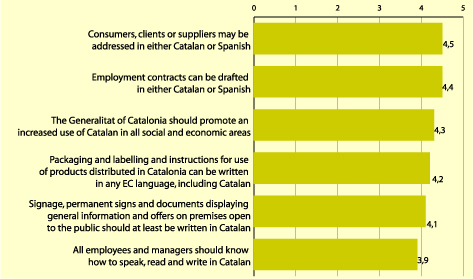5.2. Agreement with the Language
Policy
A.
Legislation
The vast majority of the business managers whom we surveyed were positive towards the
ideas of the Language Policy Act. They most strongly agreed with the Act in the area of
the drafting of bilingual employment contracts (87.6%). This was followed by a similar
proportion who supported the labelling in Catalan of products distributed in Catalonia
(83.8%) and thirdly, over seven out of ten business men and women agreed that informative
signage on the premises should be in Catalan (78.1%), although 10% disagreed with this
last aspect.
B.
Language Policy
CECOT business managers approve highly of aspects of language policy carried out in recent
years by the autonomous government to promote the use of Catalan. A total of 91.8% of the
managers whom we interviewed agreed strongly or to a certain extent that consumers,
clients and suppliers should be addressed in Catalan if they so wish, and only 3.3%
disagreed.
A total of
86.3% of businessmen and women were in favour of the Generalitat of Catalonia’s
promotion of the use of the Catalan language in social and economic areas, although 6.1%
of company managers rejected this action. Thirdly, 77.1% of managers were in favour of the
idea that employees and managers must be able to read, speak and write in Catalan, whereas
12% of businessmen and women strongly or somewhat disagreed with this.
The services
sector, followed by commerce, were most strongly in favour of the promotion of Catalan use
by the Generalitat of Catalonia. The recommendation that both employees and managers know
how to speak, read and write in Catalan was also well received within the services sector.
Figure
2. To what extent do you agree that in Catalonia...?

6. General Interest in Language Services
6.1. General interest
A total of 244
of the 400 companies analysed i.e. six out of ten, were prepared to provide their details
to Department of Culture of the Generalitat of Catalonia to enable the latter to contact
them with the offer of their services.
6.2. Interest according to service type
The majority
of companies expressed an interest in the services offered by the Department for Culture
of the Generalitat of Catalonia and the Consorci per a la Normalització Lingüística,
according to the degree to which these services were used in the company. All services
that could be classified as one-off or query-type were well-received. However, services
involving a permanent policy of introducing the Catalan language attracted a lesser degree
of interest.
On a scale
where 10 represents the highest level of interest, information about spell checkers, text
checkers and computer programmes in Catalan (6.9) and the supply of specific vocabulary
(6.7) were the two services that aroused the greatest degree of interest in two out of
three companies. One in two CECOT companies was very interested in one-off queries about
specific terminology (6.5), provision of model contracts, payslips and other
administrative documents (6.3) and tailored advice in the preparation of model company
documents (6.2).
By sectors,
services revealed considerable interest in all language services, except for information
on basic and specific bibliographies. The construction sector had a great deal of interest
in the basic and specific bibliography, supply of specific vocabulary and one-off queries
about specific terminology. Both industry and commerce revealed a more modest interest in
the services on offer.
Of the
interest expressed by all companies, microcompanies were the most interested in
information on spell checkers and large companies in information on basic and specific
bibliographies. |
